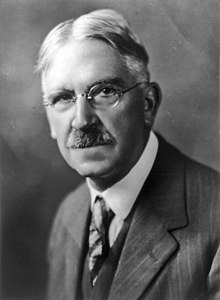
John Dewey
Philosopher, Academic
1859 – 1952
Who was John Dewey?
John Dewey was an American philosopher, psychologist, and educational reformer whose ideas have been influential in education and social reform. Dewey is one of the primary figures associated with philosophy of pragmatism and is considered one of the founders of functional psychology. A well-known public intellectual, he was also a major voice of progressive education and liberalism. Although Dewey is known best for his publications concerning education, he also wrote about many other topics, including epistemology, metaphysics, aesthetics, art, logic, social theory, and ethics.
Known for his advocacy of democracy, Dewey considered two fundamental elements—schools and civil society—as being major topics needing attention and reconstruction to encourage experimental intelligence and plurality. Dewey asserted that complete democracy was to be obtained not just by extending voting rights but also by ensuring that there exists a fully formed public opinion, accomplished by effective communication among citizens, experts, and politicians, with the latter being accountable for the policies they adopt.
Famous Quotes:
- The good man is the man who, no matter how morally unworthy he has been, is moving to become better.
- Complete adaptation to environment means death. The essential point in all response is the desire to control environment.
- The path of least resistance and least trouble is a mental rut already made. It requires troublesome work to undertake the alternation of old beliefs. Self-conceit often regards it as a sign of weakness to admit that a belief to which we have once committed ourselves is wrong. We get so identified with an idea that it is literally a pet notion and we rise to its defense and stop our eyes and ears to anything different.
- Skepticism: the mark and even the pose of the educated mind.
- We cannot seek or attain health, wealth, learning, justice or kindness in general. Action is always specific, concrete, individualized, unique.
- Man is not logical and his intellectual history is a record of mental reserves and compromises. He hangs on to what he can in his old beliefs even when he is compelled to surrender their logical basis.
- Modern life means democracy, democracy means freeing intelligence for independent effectivenessthe emancipation of mind as an individual organ to do its own work. We naturally associate democracy, to be sure, with freedom of action, but freedom of action without freed capacity of thought behind it is only chaos.
- Every great advance in science has issued from a new audacity of imagination.
- Education is a social process. Education is growth. Education is, not a preparation for life; education is life itself.
- We only think when we are confronted with problems.
We need you!
Help us build the largest biographies collection on the web!
- Born
- Oct 20, 1859
Burlington - Parents
- Siblings
- Spouses
- Alice Chipman
(1886/07 - ) - Roberta Lowitz Grant
- Alice Chipman
- Children
- Ethnicity
- White American
- Nationality
- United States of America
- Profession
- Education
- University of Vermont
( - 1879) - PhD, Johns Hopkins University
- University of Chicago
- University of Vermont
- Employment
- University of Michigan
(1884 - 1888) - University of Michigan
(1889 - 1894) - University of Chicago
(1894 - 1904) - Professor of Philosophy, Teachers College, Columbia University
(1904 - 1930) - Professor of Philosophy, Columbia University
(1904 - 1930) - President, American Psychological Association
(1899 - )
- University of Michigan
- Lived in
- Vermont
- Died
- Jun 1, 1952
New York City
Submitted
on July 23, 2013
Citation
Use the citation below to add to a bibliography:
Style:MLAChicagoAPA
"John Dewey." Biographies.net. STANDS4 LLC, 2024. Web. 26 Apr. 2024. <https://www.biographies.net/people/en/john_dewey>.

Discuss this John Dewey biography with the community:
Report Comment
We're doing our best to make sure our content is useful, accurate and safe.
If by any chance you spot an inappropriate comment while navigating through our website please use this form to let us know, and we'll take care of it shortly.
Attachment
You need to be logged in to favorite.
Log In